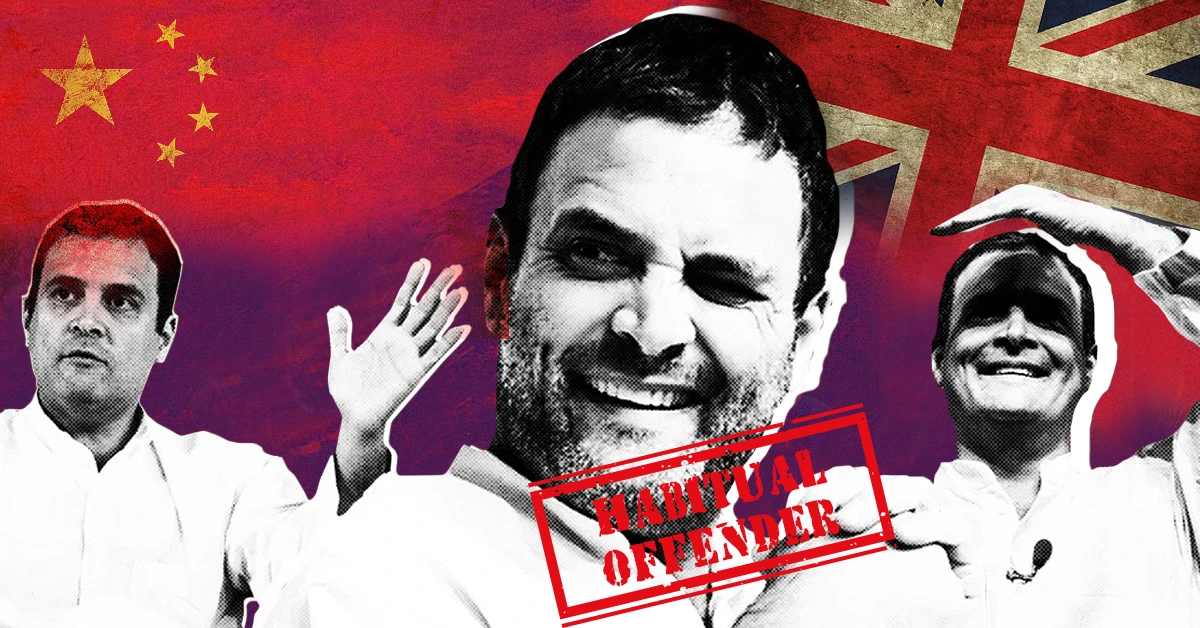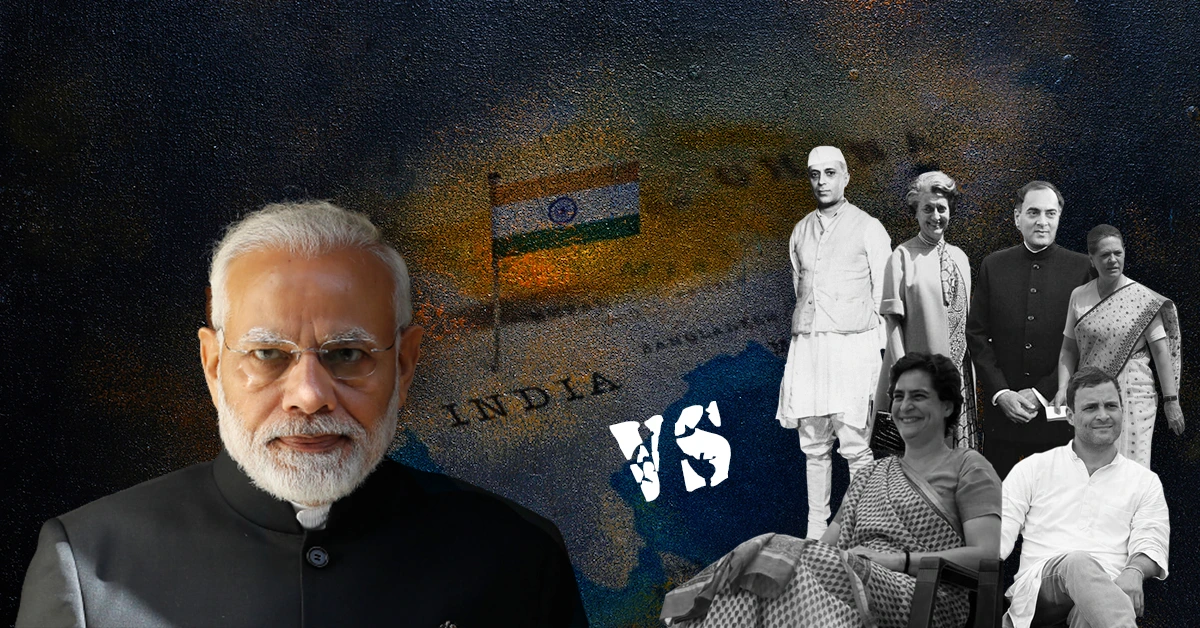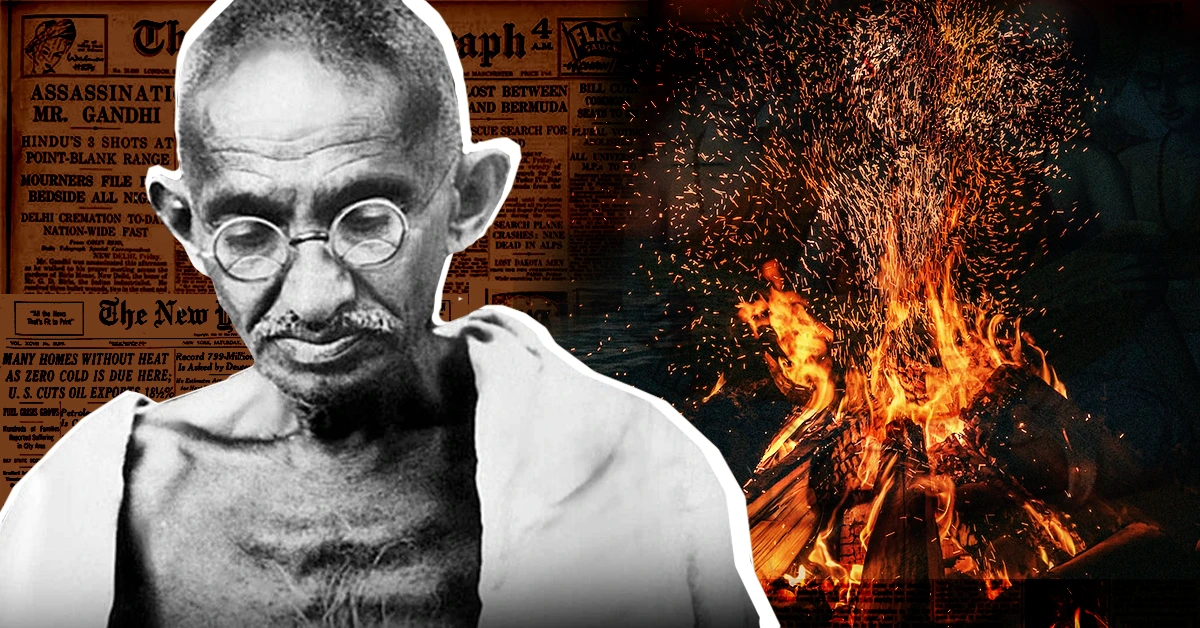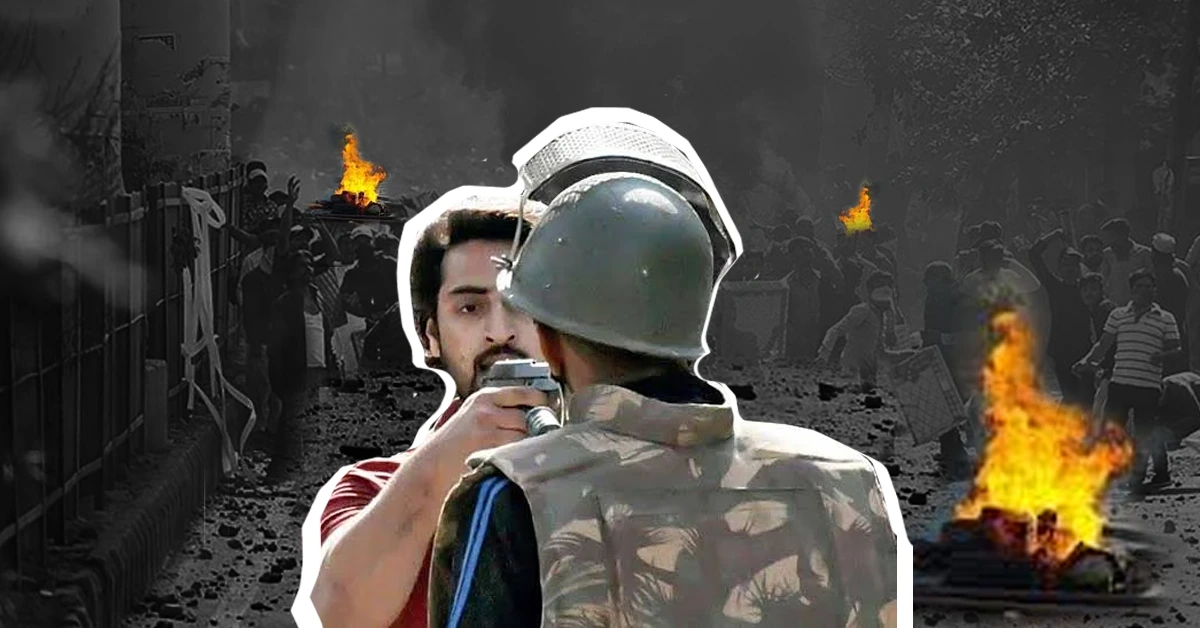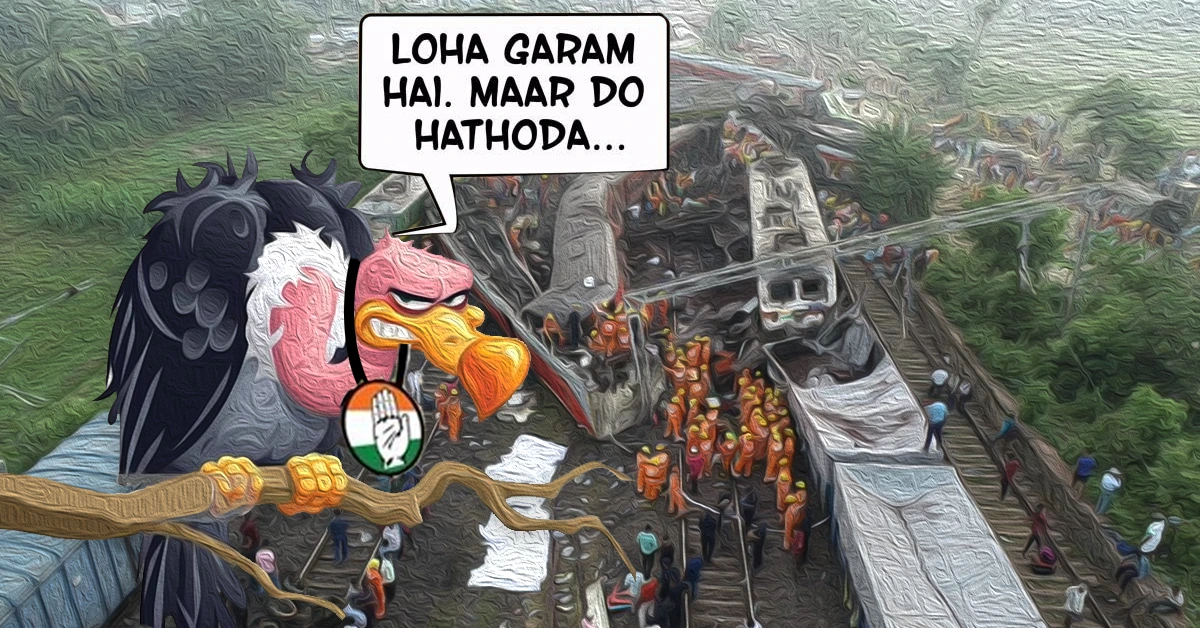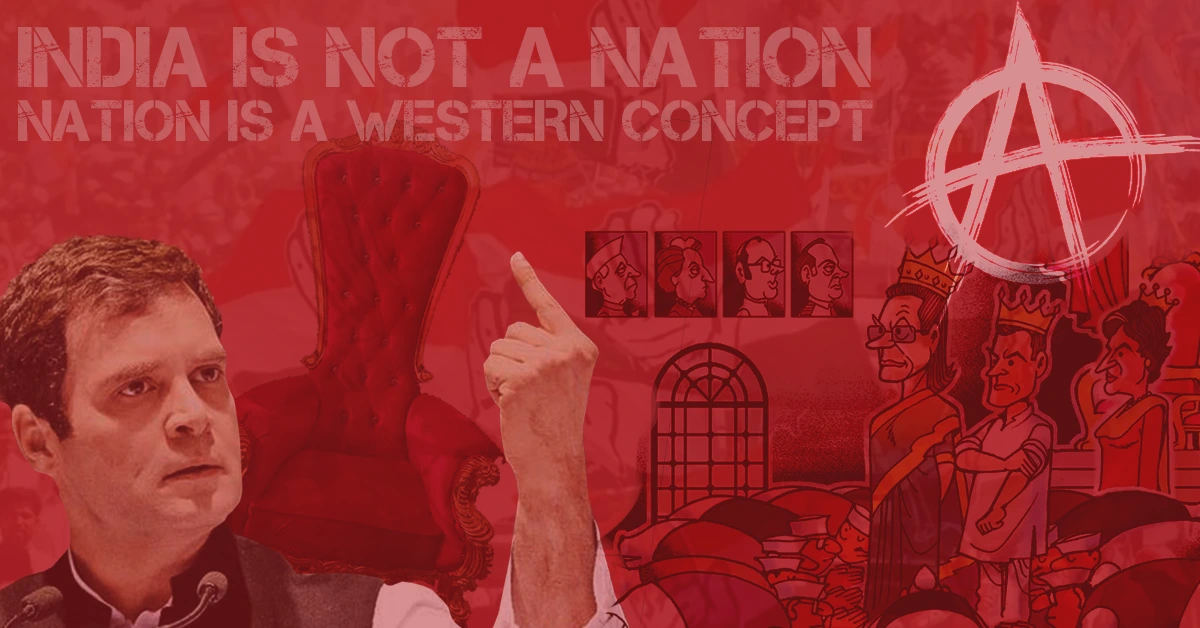Rahul Gandhi has the habit of making fabricated allegations beyond facts. There are several instances, besides him lying, where Rahul Gandhi has chosen to willingly undermine India’s sovereignty.
Restoring Democracy
To preserve the idea of India, let us remind ourselves of and reiterate our commitment to the spirit of democracy, liberty, equality & freedom which India was built on. Let us remember and salute the brave heroes of the Emergency.
Read Time: 9 minutes
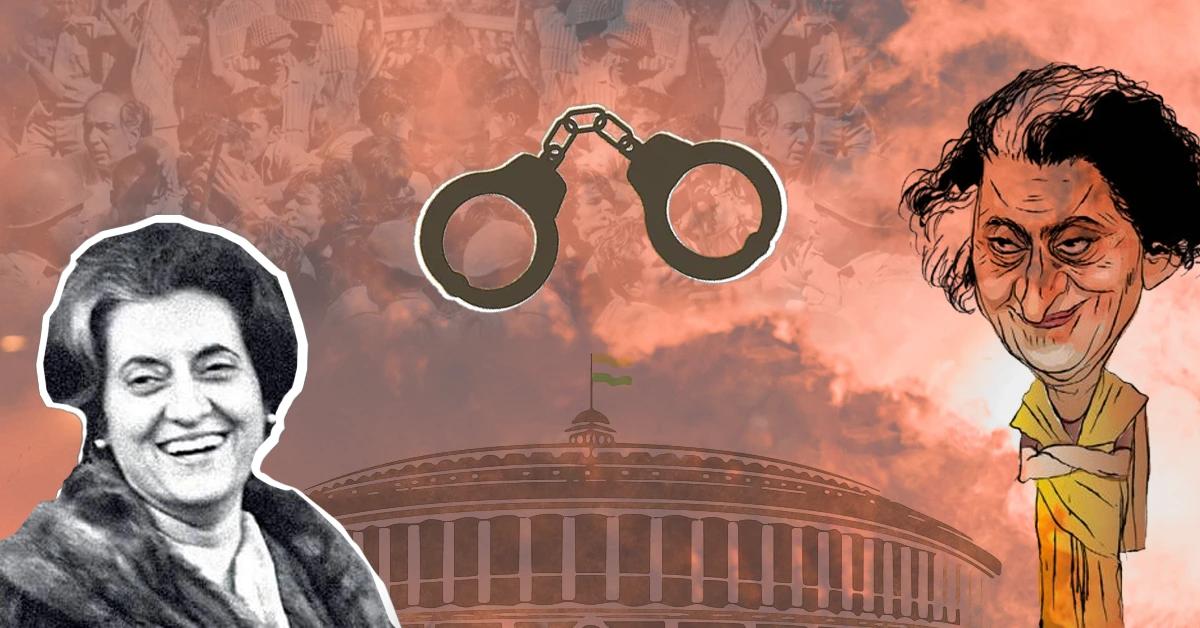
click play to listen to the article
Indira Gandhi’s imposition of the Emergency was no mere mistake; it was a sin, a constitutional crime committed for purely personal reasons, a result of the Allahabad High Court declaring her election to the Lok Sabha to be void. To justify the Emergency she claimed that a “deep and widespread conspiracy” was hatched against her (by opposition leaders) to block her from “progressive measures of benefit to common man of India”. She tried to portray the Emergency as a “bitter pill” to safeguard the nation from the troubles created by “foreign hand”.
Indira Gandhi put her political opponents behind bars; suspended the fundamental rights; extended the life of the Lok Sabha; rushed through Parliament the 42nd Constitutional amendment to undermine our democracy; attempted to give herself immunity from criminal proceedings; nullified the High Court judgment; and even made serious moves to discard the Constitution itself by convening a Constituent Assembly to establish a presidential system.
Press was censored. All news articles had to be sent to the government for approval before publishing it the next day. Any form of protest against emergency by newspaper (editors) would be curbed. Most of the newspaper printers had come to a standstill because the government had cut off their electricity supplies to make them “fall in line”.
Indira Gandhi turned the democracy into dictatorship, amended the Constitution and Election Laws to protect herself – brought in an amendment to cripple the higher Judiciary; and for empowering the President to amend the Constitution through executive orders. She forced sterilisation of the population. Bansi Lal, the then CM of Haryana and later the Defence Minister in Indira Gandhi’s Emergency cabinet personally supervised mass sterilisation camps.
The Emergency was declared on June 25, 1975. RSS swayamsevaks were thrown into prison. There were several instances where the MISA act was misused for personal and political vendetta as well. Due to number of arrests outnumbering capacity of jails, many were just tied with chains to poles & pillars. Thousands were arrested, hundreds tortured and atrocities were inflicted on defenceless people.
Individual accounts of people arrested during Emergency bring out a horrifying story. People were handcuffed to windows till they fell unconscious. Hair was pulled out from their heads. They were kept awake for days. Pins were pushed into the tip of the fingers. Women were not spared either. They were threatened with rape.
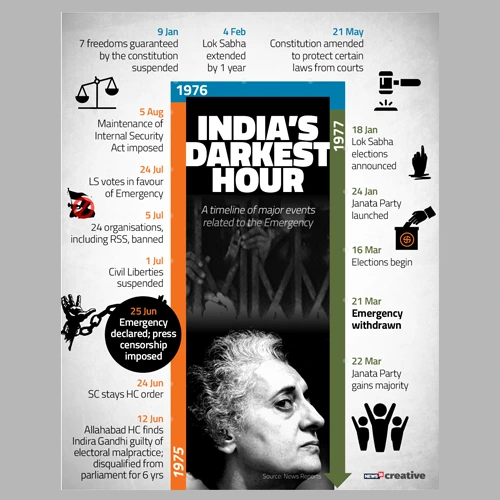
Over 1.5 lakh people offered satyagraha at 5349 places to oppose the Emergency. Of them 80 thousand were RSS swayamsevaks. 44965 of them were arrested under DIR and MISA.
Over 1,00,000 people were jailed without trail. 22 custodial deaths were reported.
Around 10 lakh people were sterilized forcibly.
RSS Sarasanghachalak Balasaheb Deoras, was arrested and put into Yerawda prison in Pune. The Rashtriya Swayamsevak Sangh which is engaged selflessly in the work making every Indian an excellent citizen and a patriot of noble character, was banned, along with 23 other bodies, on July 4. This wasn’t the first time that Indira Gandhi had attempted to ban RSS. In January 1975, S S Ray had prepared a draft to ban RSS and sent that to Indira Gandhi. However, this plan had to be postponed because this draft got leaked to the media. Emergency was then used to ban RSS.
However, the RSS kept alive an effective skeleton organisation through its shakhas. They decided to work closely with the LSS (Lok Sangharsh Samiti) – a movement against the emergency led by Jayprakash Narayan. 4 Pracharaks, Yadavrao Joshi (South), Rajendra Singh (North), Moropant Pingale (West), and Bhaorao Deoras (East) coordinated with the LSS. In addition, Rambhau Godbole and other RSS Pracharaks, including Nanaji Deshmukh coordinated with opposition party leaders.
RSS organized satyagrahas demanding removal of emergency and restoration of democracy; lifting press censorship; releasing all the arrested leaders and lifting the ban on RSS. They distributed anti-emergency literature to the people, and collected funds to support the families of those who were behind the bars. Over 1.5 lakh people offered satyagraha at 5349 places. Of them 80 thousand were RSS swayamsevaks. 44965 of them were arrested under DIR and MISA. Inspite of being treated as ‘untouchables’, RSS helped protect many underground leaders, regardless of their political affiliation. On November 3, 1977, after Emergency was lifted, JP addressed Sangh swayamsevaks in a camp. He praised the Sangh as a “revolutionary organisation, there is no other organisation in the country which can match you.”
After the Emergency was lifted, Indira Gandhi approached Balasaheb Deoras with an olive branch to withdraw the ban on the RSS if it did not support the Janata Party. But Deoras firmly declined. The general elections that followed the Emergency saw the Janata Party – a mix of political parties which fought against the Emergency win a massive mandate and Morarji Desai became the Prime Minister. This spirit, however, was short-lived. The sacrifices of RSS were soon forgotten. Some members of the Janata Party objected about members of the Bharatiya Jana Sangh continuing to be members of the RSS. The Jana Sangh refused to undermine the contribution of the RSS and the Janata Party fell apart in 1988. Charan Singh of the Janata Dal grabbed this opportunity and became the next PM. The RSS and the erstwhile members of the Jana Sangh formed a new political party, the Bharatiya Janata Party, on April 6, 1980, with Atal Bihari Vajpayee and Lal Krishna Advani as its leaders. That is how the lotus first bloomed in the muddy waters of the failed Janata Party experiment.
Today’s opposition and their cabal in lutyens media during the campaign for general elections 2019 tried to create an atmosphere suggesting democracy would be in danger if Narendra Modi was voted back to power. They conveniently forget that democracy was infact threatened only under the Congress rule. Starting from Nehru who arrested and jailed Majrooh Sultanpuri for two years for reciting a poem written against him to the mysterious death of Bharatiya Jana Sangh founder, Dr. Shyama Prasad Mukherjee.
Indira Gandhi followed in the footsteps.
RSS has always offered succour to Indian citizens. Emergency wasn’t the first time that the RSS helped the nation get back to its feet, and as history proves, it wasn’t the last either. Always soft spoken, disciplined, and ever-willing to sacrifice their own comforts and conveniences to serve others, RSS swayamsevaks had sheltered leaders of all political stripes and colours, as well as protected their families during the Partition.
Retired justice K.T Thomas said, “If asked why people are safe in India, I would say that there is a Constitution in the country, there is democracy, there are the armed forces, and fourthly the RSS is there. What prompts me to say is that the RSS had worked against the Emergency. The RSS’s strong and well-organised work against the Emergency had reached then Prime Minister Indira Gandhi…. She understood that it could not go (on for) long.”
Sangh’s functionaries suffered the most during the Emergency. At least 87 swayamsevaks sacrificed their lives during the Emergency. Thousands were arrested, jobs were lost, and families suffered irreparable losses. Yet, even after suffering tremendous hardships and privation – in the country of their own and at the hands of their own – after the emergency was lifted, these humble swayamsevaks simply returned to their normal lives without expecting any special favours for their contribution. After his release from the prison, Balasaheb Deoras said that it was time to “forgive and forget” and not be vindictive against anyone.
On this “Black Day”, 25 June 2019, let us remember the sacrifices and courage of those swayamsevaks who fought tooth-and-nail to restore democracy and freedom in India. To preserve the idea of India, let us remind ourselves of and reiterate our commitment to the spirit of democracy, liberty, equality & freedom which India was built on. Let us remember and salute the brave heroes of the Emergency.
Tags: Congress, Bharatiya Janata Party
Share this article:
Leave a Comment
Recommended For You
Between choosing the high moral ground and the practical path, the Bharatiya Janata Party (BJP) chose the practical one by aligning with Ajit Pawar. To blame the BJP for not choosing the moral high ground while giving a clean-chit to others for playing dirty politics is nothing but hypocrisy.
The Gandhi family always places its partisan interest on a higher pedestal than national interest, and Narendra Modi’s biggest political contribution is to end this dynastic rule. India must unite again and stand firmly behind Narendra Modi to defeat this multi-cornered assault on India’s narrative as a rising power.
India stands transformed under Modi’s leadership, achieving milestones in infrastructure, security, and economic growth once neglected under Gandhi rule. Yet, persistent pessimism blinds us to this progress. To secure India’s future, voters must embrace decisive leadership and reject divisive dynasties.
In the aftermath of partition, Nehru's catastrophic decisions on Kashmir showcased a stunning lack of foresight and spine. His pathetic reliance on British advice and the premature ceasefire exposed a feeble leader prioritizing personal agendas over national interests. Nehru's betrayal of minority concerns, particularly the callous dismissal of Kashmiri Pandits, →Read More →
On 30 January 1948, the Indian state under Congress decided to punish the Brahmins for no crime of theirs. Devotees of Gandhian Ahimsa were unleashed on innocent Brahmins to perpetrate a political genocide. Congress supported mobs pillaged, burnt and looted the homes of hundreds of innocent Brahmin families. These burning →Read More →
Rahul Gandhi’s modus operandi has remained the same — propagating lies, making baseless accusations and spreading false narratives with the intent to tarnish Narendra Modi’s image. But every time he tries doing it, he falls flat on his face.
With the passing of the CAA, stormtroopers in the lutyens media appears to have become the purveyor of inflammatory falsehoods with the sole intention of vilifying Narendra Modi. It then becomes necessary to to draw a distinction between truth and propaganda.
Just as the pig revels in its muddy playground, the Congress party seems to derive pleasure from engaging in dirty politics, making it futile to expect a balanced view or any constructive contributions from them. Repeatedly, the Congress party has demonstrated that their sole objective is to acquire power for →Read More →
Rahul Gandhi’s Bharat Jodo Yatra is an attempt for starting a new divisive agenda of North vs South, one state vs the other, and importantly, states vs the BJP government at the center. It is an attempt to loosen the bolts of national unity.

